|
|
|
Sort Order |
|
|
|
Items / Page
|
|
|
|
|
|
|
| Srl | Item |
| 1 |
ID:
128513
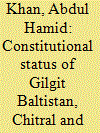

|
|
|
|
|
| Publication |
2013.
|
| Summary/Abstract |
Before the partition of the Indian sub-continent, the British handed over the tiny states including Yasin, Punial, Gupis, Ishkoman, Gilgit, Nagar, Hunza, Astore and Chilas to the Maharaja of Kashmir. Chilas was under the suzerainty of Yasin even after 1947. Before 1860, Mastuj (now part of Chitral), Gupis and Ishkoman were also integral parts of Yasin. After the murder of British spy Col. George Hayward by the Yasin ruler Mir Wali in 1873, differences between the State of Yasin and the British government had deepened. The British reacted by separating Mastuj, Koh Ghizer, Gupis and Ishkoman from Yasin. Rundu, Kharmang, Skardu, Ladakh and Astore remained under the direct control of Maharaja of Jammu and Kashmir. Before the partition of India, the Maharaja of Kashmir, on 1 August 1947, took over the administration of the entire Gilgit-Baltistan, i.e., former Gilgit Wazarat north of the Indus and all political districts. The area together with Bonji formed the Gilgit frontier province. Maharaja of Kashmir appointed Brigadier Ghansara Singh as the Governor, and also sanctioned the budget for the Gilgit frontier province.
|
|
|
|
|
|
|
|
|
|
|
|
|
|
|
|
| 2 |
ID:
127058
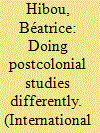

|
|
|
|
|
| Publication |
2013.
|
| Summary/Abstract |
Mohamed Tozy is certainly one of the better known Moroccan intellectuals in the Arab world and in Europe, in particular for his publication of the book Monarchie et islam politique au Maroc (Monarchy and Political Islam in Morocco) which is a classic in social sciences and political studies.2 He is a Professor at the Institute of Political Science (Institut d'Etudes Politiques, IEP) in Aix-en-Provence and at the Hassan II University in Casablanca and also a researcher at LAMES (LAboratoire MEditerranéen de Sociologie) of the Maison Méditerranéenne de Sciences Humaines d'Aix-Marseille as well as at CHERPA (Croyance, Histoire, Espace, Régulation Politique et Administrative). In 2005, he set up the Centre Marocain des Sciences Sociales (CM2S), which is the first one of its kind in social sciences in Morocco to have included a doctoral school. He is presently in the process of setting up a faculty for social sciences at the Mohamed VI polytechnic University
|
|
|
|
|
|
|
|
|
|
|
|
|
|
|
|
| 3 |
ID:
124874
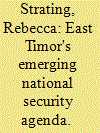

|
|
|
|
|
| Publication |
2013.
|
| Summary/Abstract |
This article focuses on the steps East Timor has taken to bolster its defense sector following its attainment of independence in 2002. In International Relations, scholars have often argued that the ability to defend territory and population from external threat is an essential component of sovereign statehood. Literature on post-colonial sovereignty, however, suggests that the external sovereignty of "weak" post-colonial states is more likely to be protected through international legal recognition. In recent years, East Timor has sought to develop their defense capacities in line with conventional thinking about security and "real" independence. This influences the foreign relations of East Timor and also has broader implications for understanding security and independence in post-colonial states.
|
|
|
|
|
|
|
|
|
|
|
|
|
|
|
|
| 4 |
ID:
127333


|
|
|
|
|
| Publication |
2013.
|
| Summary/Abstract |
Since the founding of the Jewish state in 1948, Evangelical Protestants in the United States have been regarded-with good reason-as Israel's most reliable supporters. In 2008, Jody C. Baumgartner and a number of other researchers reported that Evangelicals are "more likely than other Americans to have sympathy for Israel in its dispute with the Palestinians and to agree that the United States should take Israel's side more often in the Middle East."1 More recently, a poll conducted by the Pew Charitable Trust indicated that Evangelicals are more likely than other American Jews to believe that God gave the land to the Jewish people.2 In addition to the belief that God's promises endure forever, much Evangelical support for Israel is motivated by an understanding of the religious component of Arab hostility toward Israel. Evangelicals, Baumgartner and her colleagues reported, are "significantly more likely than other Americans to agree that Islam is a more violent religion than Christianity, Judaism, or Hinduism."3 Other factors related to Evangelical support for Israel include an adherence to premillenial dispensationalism (an eschatology that posits that the return of the Jews to their homeland is a precursor to the return of Jesus Christ),4 gratitude to the Jewish people for their scriptures, and remorse over the Holocaust.5
|
|
|
|
|
|
|
|
|
|
|
|
|
|
|
|
| 5 |
ID:
131957


|
|
|
|
|
| Publication |
2014.
|
| Summary/Abstract |
Existing literature has long recognized that a partnership has been forged between the PRC government and Hong Kong's capitalist class. However, the implications of such a partnership for HKSAR governance have yet to be thoroughly explored. By examining the formation of this partnership and its consolidation after 1997, this article argues that the business sector's direct access to the sovereign state has fundamentally changed the dynamics of state-business relations in the HKSAR. As a consequence of the partnership between Beijing and the business sector, business elites have taken their concerns straight to the mainland authorities whenever they see their interests affected by the post-colonial state. This kind of circumvention has become a part of post-1997 politics, undermining the relative autonomy of the post-colonial state and resulting in growing cleavages within the state-business alliance during the first 15 years of the HKSAR. Whether and how such a partnership will evolve in the aftermath of the 2012 chief executive election remains to be seen.
|
|
|
|
|
|
|
|
|
|
|
|
|
|
|
|
| 6 |
ID:
131956
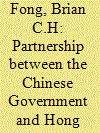

|
|
|
|
|
| Summary/Abstract |
Existing literature has long recognized that a partnership has been forged between the PRC government and Hong Kong's capitalist class. However, the implications of such a partnership for HKSAR governance have yet to be thoroughly explored. By examining the formation of this partnership and its consolidation after 1997, this article argues that the business sector's direct access to the sovereign state has fundamentally changed the dynamics of state-business relations in the HKSAR. As a consequence of the partnership between Beijing and the business sector, business elites have taken their concerns straight to the mainland authorities whenever they see their interests affected by the post-colonial state. This kind of circumvention has become a part of post-1997 politics, undermining the relative autonomy of the post-colonial state and resulting in growing cleavages within the state-business alliance during the first 15 years of the HKSAR. Whether and how such a partnership will evolve in the aftermath of the 2012 chief executive election remains to be seen.
|
|
|
|
|
|
|
|
|
|
|
|
|
|
|
|
| 7 |
ID:
128125
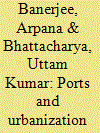

|
|
|
|
|
| Publication |
2013.
|
| Summary/Abstract |
Port had played an important role in colonial trade and urbanization. In pre-colonial period, riverine and maritime routes where major means of transportation, as there was a lack of fast moving, developed land transport systems. As a result, trade in India was mostly riverine and sea borne trade, rather than land borne trade. While riverine trade was mostly related to inland trade. Sea trade was related external trade.
|
|
|
|
|
|
|
|
|
|
|
|
|
|
|
|
| 8 |
ID:
130220
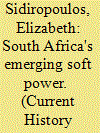

|
|
|
|
|
| Publication |
2014.
|
| Summary/Abstract |
African nations do not often come to mind as primary agents of soft power. Africa's marginalization in the global economy, its own internal conflicts, and the autocratic regimes that ruled many of its countries until the end of the Cold War all limited the cultivation of soft power. Yet the democratization that
swept through the continent in the 1990s sowed the seeds for the current decade's optimistic "African Rising" narrative. Africa is the next frontier of growth, with unsaturated markets, abundant natural resources, and a growing middle class. Once a continent of poverty and war, Africa is now a region of infinite possibilities with many competing suitors. Conflicts persist in places such as the Great Lakes
and the Horn of Africa, but many states boast strong economic growth, albeit with slow improvement
in living standards.
|
|
|
|
|
|
|
|
|
|
|
|
|
|
|
|
| 9 |
ID:
127352
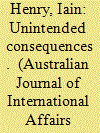

|
|
|
|
|
| Publication |
2014.
|
| Summary/Abstract |
The Howard government's foreign policy objectives concerning East Timor remain the subject of intense historical debate. Given that some Indonesians harbour suspicions about Australia's role in East Timor's independence, it is important to reflect on Australia's diplomacy throughout this period. This article draws on 15 interviews with former politicians and officials-including Prime Minister John Howard and Foreign Minister Alexander Downer-to argue that in 1998, Australia's foreign policy was focused on supporting Indonesia's democratisation process and maintaining the bilateral relationship. It was only when Indonesia moved towards a 'special status' of autonomy for East Timor that Australia reconsidered its own position. Although rarely acknowledged, Australia's policy shift actually precipitated outcomes that it had sought to avoid. As such, Habibie's decision to allow self-determination in East Timor can only be viewed as an unintended consequence of Australian diplomacy-independence was never the objective of Australian foreign policy.
|
|
|
|
|
|
|
|
|
|
|
|
|
|
|
|
|
|
|
|
|